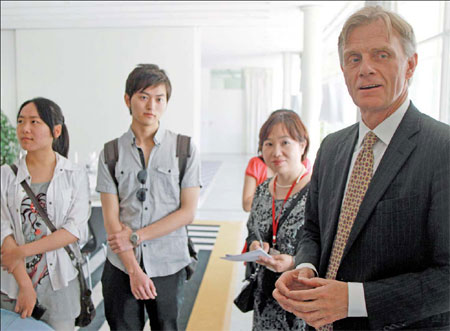Database of DNA reunites families
Updated: 2011-09-26 07:53
By Zhou Wenting (China Daily)
|
|||||||||
BEIJING - Fu Ming'ai was reunited with his family on Sunday after 22 years.
He is one of the more than 1,400 abducted children who were helped by a national DNA database, which helps match trafficked children and their parents.
"This shows the superiority of the national database," Chen Shiqu, director of the Ministry of Public Security's anti-human trafficking office, said on Sunday. The database was established in April 2009, when the ministry launched a nationwide crackdown on human trafficking.
"The ministry's branches across the country have been ordered to take blood samples of unidentified children and enter the information in the DNA database. Meanwhile, parents who report children missing also have their samples deposited in the repository," Chen said. "The database will point out matches for parents and children."
DNA testing is accurate for both individual identification and kinship relations, and it is acknowledged as one of the most effective techniques to identify abducted children, according to the ministry.
Fu, who was named Liu Qiang by his adoptive family in Shijiazhuang, capital of Hebei province, was picked up by his entire family at the railway station in his home city of Jishou, Hunan province.
"I resolved to find my parents, because I know I was kidnapped, not abandoned," said Fu, 26, a technician in an auto parts company in Tianjin. He remembered one day when he was 4, someone sprayed a substance in front of his face so that he could not open his eyes, and he was taken on a train.
Fu left a blood sample with the DNA database in July. One month earlier, his parents had their blood samples taken when police said this could help the search for their son.
"I prayed to the gods, even in my dreams, to give my son back. He finally returned," said 55-year-old father Fu Gaomao, who was informed on Thursday of the successful match.
"Abducted children are found matching with their biological parents in the information bank every day," said Zhang Baoyan, founder of Baobeihuijia, or Baby Back Home, a volunteer group that assists in the nationwide search for missing children and offers support to their parents.
Zhang said the platform works because DNA is more durable than a child's appearance or memories of families and home villages, which can fade in the years after a child is abducted. Moreover, it transcends provincial borders.
"Distraught parents in one province might not know some children were rescued elsewhere. Now they just have to wait at home after leaving their blood samples," Zhang said.
The past two years have seen a major role for the database, but she expects more parents in remote areas to go to the police to leave blood samples.
"Some farmers have weak legal awareness and don't know what DNA is," she said. "With the popularization of knowledge of the database, the possibility of matches will rise."
Zhang said the government should continue to toughen measures to tackle the scourge of child trafficking.
"On the one hand, the buyers' market, which is the source of the problem, should be blocked.
"On the other, the police should tighten penalties for traffickers. The cost of breaking the law is very low if they are only jailed for three or five years," she said.










